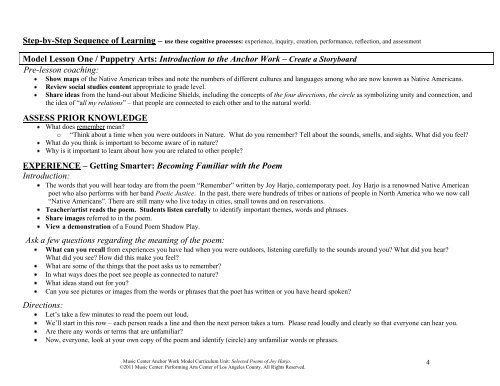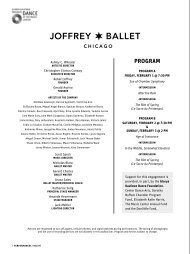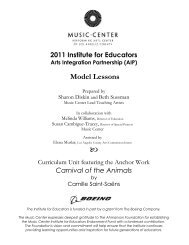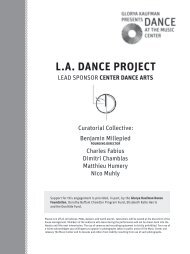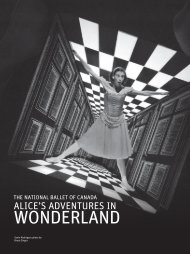Selected Poems of Joy Harjo - Music Center
Selected Poems of Joy Harjo - Music Center
Selected Poems of Joy Harjo - Music Center
You also want an ePaper? Increase the reach of your titles
YUMPU automatically turns print PDFs into web optimized ePapers that Google loves.
Step-by-Step Sequence <strong>of</strong> Learning – use these cognitive processes: experience, inquiry, creation, performance, reflection, and assessment<br />
Model Lesson One / Puppetry Arts: Introduction to the Anchor Work – Create a Storyboard<br />
Pre-lesson coaching:<br />
Show maps <strong>of</strong> the Native American tribes and note the numbers <strong>of</strong> different cultures and languages among who are now known as Native Americans.<br />
Review social studies content appropriate to grade level.<br />
Share ideas from the hand-out about Medicine Shields, including the concepts <strong>of</strong> the four directions, the circle as symbolizing unity and connection, and<br />
the idea <strong>of</strong> “all my relations” – that people are connected to each other and to the natural world.<br />
ASSESS PRIOR KNOWLEDGE<br />
What does remember mean?<br />
o “Think about a time when you were outdoors in Nature. What do you remember? Tell about the sounds, smells, and sights. What did you feel?<br />
What do you think is important to become aware <strong>of</strong> in nature?<br />
Why is it important to learn about how you are related to other people?<br />
EXPERIENCE – Getting Smarter: Becoming Familiar with the Poem<br />
Introduction:<br />
The words that you will hear today are from the poem “Remember” written by <strong>Joy</strong> <strong>Harjo</strong>, contemporary poet. <strong>Joy</strong> <strong>Harjo</strong> is a renowned Native American<br />
poet who also performs with her band Poetic Justice. In the past, there were hundreds <strong>of</strong> tribes or nations <strong>of</strong> people in North America who we now call<br />
“Native Americans”. There are still many who live today in cities, small towns and on reservations.<br />
Teacher/artist reads the poem. Students listen carefully to identify important themes, words and phrases.<br />
Share images referred to in the poem.<br />
View a demonstration <strong>of</strong> a Found Poem Shadow Play.<br />
Ask a few questions regarding the meaning <strong>of</strong> the poem:<br />
What can you recall from experiences you have had when you were outdoors, listening carefully to the sounds around you? What did you hear?<br />
What did you see? How did this make you feel?<br />
What are some <strong>of</strong> the things that the poet asks us to remember?<br />
In what ways does the poet see people as connected to nature?<br />
What ideas stand out for you?<br />
Can you see pictures or images from the words or phrases that the poet has written or you have heard spoken?<br />
Directions:<br />
Let’s take a few minutes to read the poem out loud.<br />
We’ll start in this row – each person reads a line and then the next person takes a turn. Please read loudly and clearly so that everyone can hear you.<br />
Are there any words or terms that are unfamiliar?<br />
Now, everyone, look at your own copy <strong>of</strong> the poem and identify (circle) any unfamiliar words or phrases.<br />
<strong>Music</strong> <strong>Center</strong> Anchor Work Model Curriculum Unit: <strong>Selected</strong> <strong>Poems</strong> <strong>of</strong> <strong>Joy</strong> <strong>Harjo</strong>.<br />
©2011 <strong>Music</strong> <strong>Center</strong>: Performing Arts <strong>Center</strong> <strong>of</strong> Los Angeles County. All Rights Reserved.<br />
4


